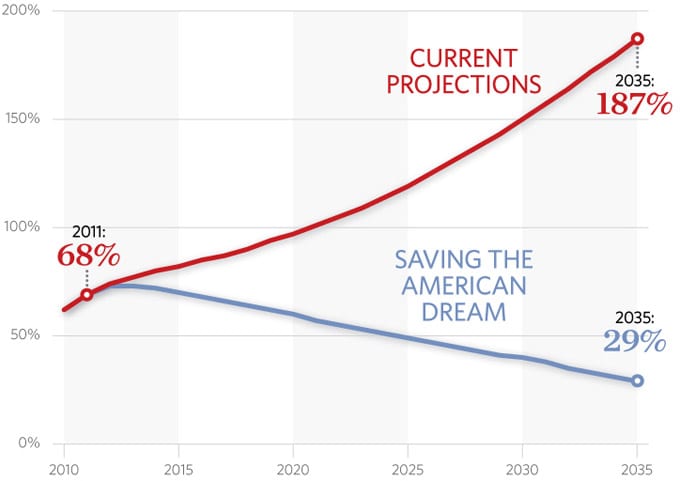Some Conservative Theories on Why America Has So Much Consumer Debt
Conservatives and liberals agree that high levels of national consumer debt continue to deter financial freedom and stifle the economy as a whole. But those with opposing political views disagree on the cause of the current recession as well as on the best approach to recovery.
Conservatives and Republicans believe consumer debt is the result of long-standing financial indiscretion by consumers. They believe the government can help people and the economy get back on track, but that it’s ultimately up to individuals and families to make changes in their spending and saving habits.
Liberals, on the other hand, believe the U.S. recession is the result of a flawed economic system and is the government’s responsibility to fix. Conservatives argue this is not helping the country recover and there must be policy changes.
Why We Have So Much Debt
Conservatives argue that excessive consumer debt is a result of a recession they believe is ongoing, one that stems from mishandled money, too many taxes and overspending – mostly government overspending. Those in the middle and lower classes simply took out loans and mortgages without any ability to repay them.
As two reporters for the Wall Street Journal summarized it, the recession was the result of a “massive consumption binge” focused in the lower class.
Ben Bernanke, chairman of the Federal Reserve, said it all comes down to home values. When home values dropped, people were left with little or no home equity.
As a result, some borrowers were left with underwater mortgages, owing more than their homes were worth. People struggled to build up home equity and meet their monthly bills. This left no room for discretionary spending, which accounts for 70 percent of economic activity.
Reducing Household Debt
Because conservatives believe finances come down to personal responsibility, they advocate actions to promote greater fiscal awareness. Conservatives also back plans to create new jobs and reduce debt burdens without reducing debt directly.
The Heritage Foundation, a leading conservative think tank, proposed a plan in 2011 to fix Americans’ debt problem. The foundation claimed that the plan could get the U.S. government out of debt entirely within a decade, while at the same time encouraging individuals and families to pay down their personal debts.
The plan, titled “Saving the American Dream,” largely relies on trimming government aid programs, specifically Social Security, Medicare and Medicaid.
It addresses consumer debt with a proposed tax reform that would do away with income tax entirely. Instead, government funding would come from a flat-rate expenditure tax. So, money would be taxed only when people spent it rather than when they earn it.
Members of The Heritage Foundation believe this would encourage people to more strongly evaluate their expenses and purchases. This in turn would promote financial responsibility and savings.
Republicans have another plan to combat the economic stalemate caused by devalued homes. They are urging banks to grant loans and mortgages at lower interest rates to help families get back on their feet. This would allow current borrowers to refinance or consolidate their loans at lower interest rates. It also would allow new borrowers to take out loans and ease their current debt burdens.
Conservatives hope this will rejuvenate discretionary spending and have a stimulating effect on the economy.
They also believe that adding new jobs is crucial, not only for the economy’s recovery but also for its continued growth. Economists for Fox News estimate that the economy needs to grow at 3 percent per year just to keep up with a growing work force, a rate that the country is not currently meeting.
Criticism of Liberal Actions
Conservatives have sharp criticisms for Democratic President Obama’s record since taking office in January 2009. The economy, measured in terms of gross domestic product (GDP), has grown at an average of 2.4 percent a year under Obama. This falls short of the 3 percent marker conservatives say is necessary.
Republican presidential candidate Mitt Romney believes the low number is a direct result of Obama’s liberal policies. Obama’s policies, he says, stifle the market rather than encourage spending freedom.
Conservatives compare today’s 2.4 percent growth to the economic recovery during Ronald Reagan’s conservative presidency in the 1980s. Reagan, conservative believe, inherited a similarly struggling economy but handled the situation better. By making policy changes to the private sector, he allowed the economy to grow at a rate of 7.1 percent.








